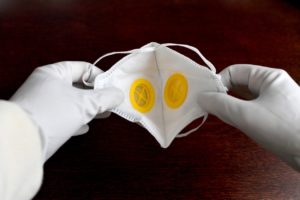PPE
Face coverings in the workplace
To get some recommendations on face coverings in the workplace, for employers and employees, SHP spoke to Arco’s Director of QSHE UK and Asia, Neil Hewitt.
Is a face covering and a face mask the same thing?
 Neil Hewitt (NH): “No, it’s important to distinguish between face coverings, face masks and PPE such as respirators.
Neil Hewitt (NH): “No, it’s important to distinguish between face coverings, face masks and PPE such as respirators.
“A face covering can be any covering of the mouth and nose, made of cloth or other textiles and through which an individual can breathe. Religious face coverings, a scarf, a snood or a bandana can count as face coverings.
“Face coverings are not manufactured to a recognised standard and do not require CE marking. They are not the same as face masks which are manufactured to specifications for medical/surgical masks (which are deemed as medical devices in accordance with the EU Medical Device Regulations) and classified as Type I, Type II or Type IIR.
“Importantly, they should not be used as an alternative to PPE which is used to manage risks in the workplace. Respirators or filter masks FFP2, FFP3 are manufactured to recognised standards for PPE and classified as category III personal protective equipment under the PPE Regulations.”
What is the current government advice for face coverings in the workplace?
(NH): “There is no one piece of guidance about face coverings in the workplace as there are so many different working environments. The Government Guidance series of documents ‘Working Safely’ provide links to ‘When and Where to Wear Face Coverings’.
“The Department for Business, Energy and Industrial Strategy (BEIS) stresses the importance of undertaking a risk assessment to identify risks posed by COVID-19 and to use this to determine the correct control measures to introduce. It has provided guidance for specific industrial sectors.
“The Health and Safety Executive (HSE) makes similar recommendations, that if workers choose to wear a face covering, then they should be supported.”
Should employers require employees to wear face coverings?
(NH): “Employers have a duty to protect workers from harm to health which could happen as a result of a work related activity and therefore this includes taking reasonable steps to protect workers and others from COVID-19. Therefore, legally, employers are required take all reasonably practicable measures to protect employees and members of the public. However, for the workplace, the guidance does not recommend employees wear face masks, but for the risk to be managed through other control measures.
“It is not compulsory for shop, supermarket, bank, post office or transport workers to wear face coverings, although guidance recommends that employers may consider their use where appropriate and where other mitigations are not in place, and this advice could be considered for other environments as well. There is increasing evidence to suggest that the wearing of face coverings will not only prevent the spread of the virus but can also go some way to protect the wearer. Therefore, it could be considered as additional protection alongside other control measures.”
Can employers require employees to wear face masks?
(NH): “Whilst it is not mandatory, there are some circumstances when wearing a face covering may be marginally beneficial. Employers should also note that the use of occupational workwear and PPE should continue to apply.”
Do employers cover the costs of employee face coverings?
(NH): “If a risk assessment identifies that face coverings are recommended, then an employer should provide these free of charge to workers who need them.”
Do construction workers have to wear a face covering?
(NH): “Where employers already issue PPE to protect against non-COVID-19 risks, then it is important that they continue to do so. The guidance states that additional PPE as a precautionary measure to protect against COVID-19 is not beneficial.”
What if an employee declines to wear a face covering for medical reasons?
 (NH): “In some situations, there may be exemptions to wearing face coverings due to age, health or equality reasons or there may be a reasonable excuse not to wear them. Check local guidelines for information.
(NH): “In some situations, there may be exemptions to wearing face coverings due to age, health or equality reasons or there may be a reasonable excuse not to wear them. Check local guidelines for information.
“There are some people who should not wear a face covering, namely:
- Those who have trouble breathing;
- Anyone who finds it difficult to manage them correctly due to a physical or mental illness or impairment, or disability;
- Those who would suffer severe distress.
“For those who are unable to wear face coverings, a face visor may be used, but it should cover the wearer’s nose and mouth completely.”
If workers wear cloth face coverings, do employers still need to ensure social distancing measures in the workplace?
(NH): “Face coverings are not a replacement for the other ways of managing risk, including social distancing, hygiene, using fixed teams and partnering, and enhanced cleaning. These other measures remain the best ways of managing risk and it is not recommended that employers rely on face coverings as risk management.”
How should employers choose appropriate face coverings?
(NH): “Face coverings are neither PPE nor medical products and therefore do not conform to any official standards. Employers will need to use different criteria to choose a face covering that is suitable.
“Employers should consider the performance efficiencies of the face covering including:
- Filtration efficiency (FE);
- Bacterial filtration efficiency;
- Breathability.
“These should be considered alongside other features that will affect the fit and the use of the mask, such as:
- Shape;
- Fastening;
- Wash ability.”
Where can employers obtain face coverings for their employees?
(NH): “It is recommended that face coverings are purchased from a reputable supplier who understands their function and who is supplying a product that is fit for purpose. Ideally look for a supplier that can provide face coverings that have been tested to the relevant standards for face masks or respirators and can provide the filtration efficiency, bacterial filtration efficiency and breathability that is required.”
How should you keep masks and face covers clean?
(NH): “A face mask should be washed in line with manufacturer’s instructions. Choose a face covering that can be washed with other items of laundry, according to standard washing instructions. Make sure that the mask that can be dried without it being damaged. Do not dry clean masks as the dry-cleaning process uses solvents that can be extremely harmful and there is a risk that residual solvents could be inhaled.”
Face coverings in the workplace
To get some recommendations on face coverings in the workplace, for employers and employees, SHP spoke to Arco’s Director of QSHE UK and Asia, Neil Hewitt.
Ankit Kumar
SHP - Health and Safety News, Legislation, PPE, CPD and Resources Related Topics
Company fined after worker crushed to death
Future-proofing safety: Five trends shaping the PPE landscape of tomorrow
Horticulture company fined after lorry driver suffers life changing injuries

 Neil Hewitt (NH): “No, it’s important to distinguish between face coverings, face masks and
Neil Hewitt (NH): “No, it’s important to distinguish between face coverings, face masks and  (NH): “In some situations, there may be exemptions to wearing face coverings due to age, health or equality reasons or there may be a reasonable excuse not to wear them. Check local guidelines for information.
(NH): “In some situations, there may be exemptions to wearing face coverings due to age, health or equality reasons or there may be a reasonable excuse not to wear them. Check local guidelines for information.
The Government COVID guidance refers to outdoor construction activities. The Construction Leadership Council’s guidance is not a government document. Could you please direct me to any Government advice on internal construction COVID control other than domestic activities?
As far as we are aware there is no other specific Government advice on internal construction. We are monitoring the situation and will advise our customers should any be published.
I note, under’ performance efficiencies’ you mention ‘bacterial filtration efficiency’; this is irrelevant as COVID-19 is a virus and at least 100 times smaller than a bacteria. Only FFP3 filter viruses
Thanks very much for your comment, the performance requirements defined within the standard for medical masks EN14683 uses the term bacterial filtration efficiency hence we used both this term and the term filtration efficiency. FFP3 are not tested against bacteria or viruses, although it is possible they may work effectively. This feature focuses on face coverings to protect others not necessarily on PPE for the wearer. We do have more information on face masks at http://www.arco.co.uk/coronavirus_advice.
The British Occupational Hygiene Society (BOHS) provide a very useful technical guidance document ; Covid 19 Face coverings in the Workplace, along with other Workplace related Covid19 guidance ; https://www.bohs.org/coronavirus-hub/
Hi,
Can you clarify if my employer has the legal power to mandate the wearing of face coverings at work (indoor), even though we are legally exempt from wearing them as we have a physical barrier separating customers from staff.
I’m having the same problem at work. I have tried to get a note from my doctor and they informed me that a note isn’t necessary to exempt you from wearing a mask and now my work have suspended me and I don’t know what to do!
Hello Grace. Do you have any update on your situation? I am in the same position as you.
Thank you
Hi Grace, Have U had any update on this as I am in the same boat
I believe an employer can mandate the use of PPE or face coverings if the Risk Assessment has concluded it would be of benefit to primary mitigations (i.e. PPE, Screens, Social distancing, Sanitisation ect), and I also don’t believe you have any legal exemption as a result of screen provision. I am no legal advisor but extesnive research suggests otherwise. My question is, if they do mandate face coverings, should they enforce it whole of workplace therefore not discriminating against other depts (large organisations) AND should they legally have to provide them as they would PPE. They have issued our… Read more »
Can my employer make me wear a face covering if I am exempt